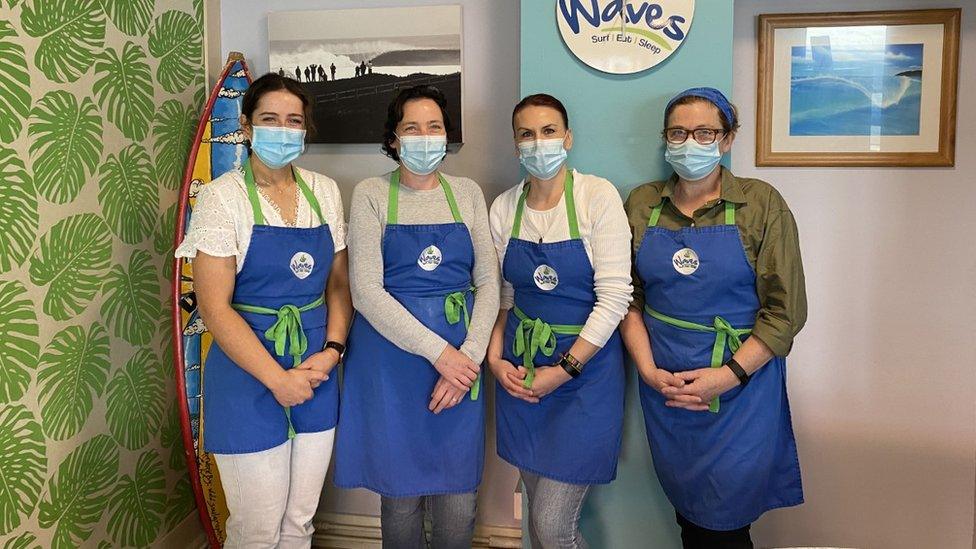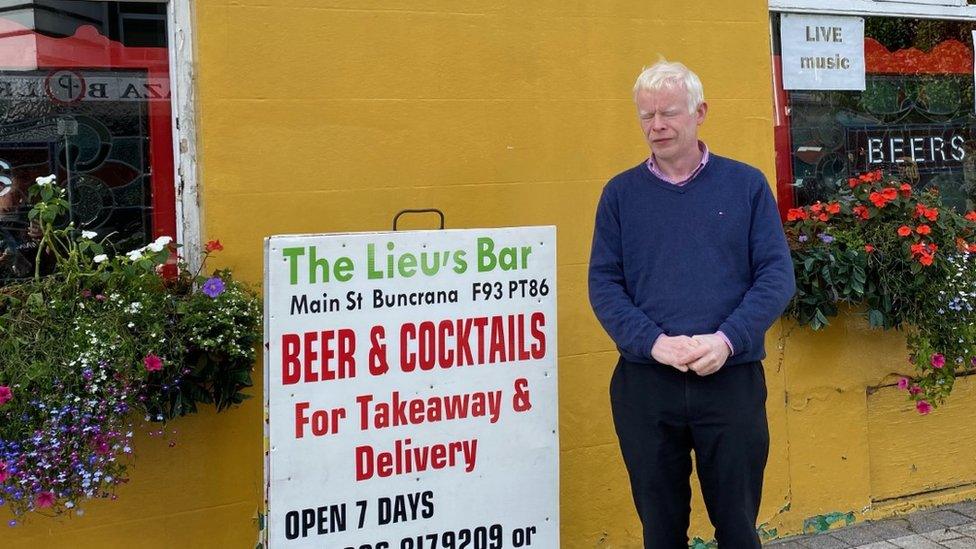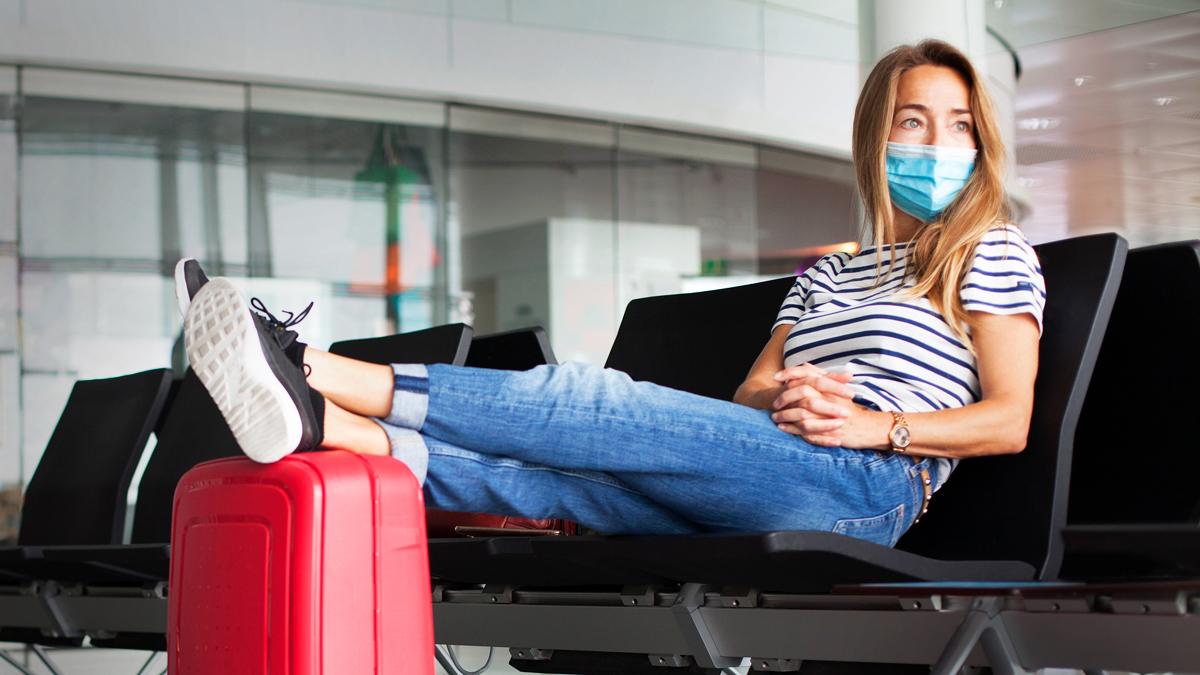Covid-19: Irish vaccine passports 'accelerated' jab uptake
- Published

Republic of Ireland residents must provide proof of vaccination to gain entry to indoor hospitality
This article, originally published on 2 October, 2021, was updated on 29 November, 2021 to reflect the fact that the EU Digital Covid Certificate remains in place in the Republic of Ireland, and that a separate Covid vaccine passport scheme has been introduced in Northern Ireland.
Covid-19 vaccine uptake in the Republic of Ireland "would have been much lower" without the vaccine passport scheme, an immunology expert has said.
Prof Kingston Mills from Trinity College Dublin said it was "a big incentive" for people to get jabbed.
The Irish government has made proof of immunity a requirement for entry, external since hospitality re-opened in July.
It applies to indoor service at pubs and restaurants, nightclubs, cinemas and theatres.
The EU Digital Covid Certificate, enables people to show proof of their vaccination status, or if they recently had a negative PCR test or recently recovered from the disease.
In the Republic of Ireland it is used to give people access to international travel and hospitality industries.
'It's done the trick'
Prof Mills said young people were the most hesitant to get vaccinated compared to the older population, "so the incentive did help there".
He said more than 90% of adults in the Irish Republic have now been vaccinated and the "vaccine passport scheme, amongst other factors, has reflected that".
Asked whether he thinks the Stormont Executive should introduce a vaccine passport scheme in Northern Ireland, he said "it is in everybody's interest, both people who are fully vaccinated and even people who aren't".
"You only have to compare our data to that in Northern Ireland or the UK where uptake is not as good," he added.
"If you're allowing people into events, whether it be pubs, restaurants or travel, it shows that you can get people to buy into this vaccine certificate," he said.
"When vaccinated people meet, the transmission or infection rate is much lower against someone who is unvaccinated.
"It's done the trick in terms of getting people vaccinated."
He said he would push for the scheme to be extended in the Republic of Ireland "a bit longer" and get the "remaining hesitant people to get vaccinated".
'Delighted to have indoor dining'
Karen Gallagher, who co-owns the Waves Surf Café in Bundoran, County Donegal, said the transition to the vaccine passport scheme has been a success despite "really, really dreading it" initially.
Ms Gallagher said that while it caused extra work for staff, particularly during busy periods at the height of the summer, they were "just so delighted that we could do indoor dining again - so we were fine with it".

Staff at the Waves Surf Café said customers reacted positively to the vaccine passport scheme
She said many customers were eager to show staff that they had been fully jabbed and they "felt good going into somewhere where everyone was vaccinated".
She added that "a few people were annoyed and walked out" but she found that most customers "were fine with showing their (vaccine) passport".
"Most people had them, or if they were from Northern Ireland they could show us their vaccination card."
'A carrot and stick element'
Adrian Cummings, chief executive of the Restaurants Association of Ireland, said vaccine passports were "the only way to get thousands of business back open and 120,000 employees back to work".
He said that while not every business embraced the scheme initially, as some hospitality staff were unvaccinated, it "accelerated the vaccine uptake".
"There was a carrot and stick element to it and while it was difficult, it was on a health basis and it was the right thing to do," he added.
He said that despite the scheme being stood down next month, "it will be part of the toolbox if we ever need to reactivate it".
"Now we're able to keep business fully open in the future."
'A price worth paying'

Paddy Henderson, owner of the Lieu's Bar in Buncrana, said there was a good level of cooperation from the public
Paddy Henderson, who owns The Lieu's Bar in Buncrana, County Donegal, said the vaccine passport scheme was "a price worth paying" to allow his customers to return.
He said the Health Service Executive (HSE) were helpful during the introduction of the scheme and "made the process simple".
"They didn't come to us with a big stick approach, they just explained to us what needed to be done and there was a good level of cooperation," he added.
Mr Henderson said reaction to the scheme has been similar to the introduction of the smoking ban in the Republic of Ireland in April 2004.
"There has been no issue with publicans or the HSE having to police it because the public policed it themselves," he said.
"Most people know who has been vaccinated and who hasn't."
A spokesperson for the Irish Department of Health said the system was introduced to allow indoor hospitality to reopen safely. The Irish government had signalled that it would be removed from the 22 October, but it remains in place, external.
Irish passport holders who live and were vaccinated in Northern Ireland can also access the EU Digital Covid Certificate.
Northern Ireland's Covid certification scheme came into effect on Monday 29 November.
It requires people to show proof of vaccination or a negative test to enter some venues, events and premises that provide alcohol.
Unlicensed venues, likes cafes, are exempt.
There is a two-week grace period before fines are imposed on venues that fail to comply.
Related topics
- Published6 August 2021

- Published30 September 2021
